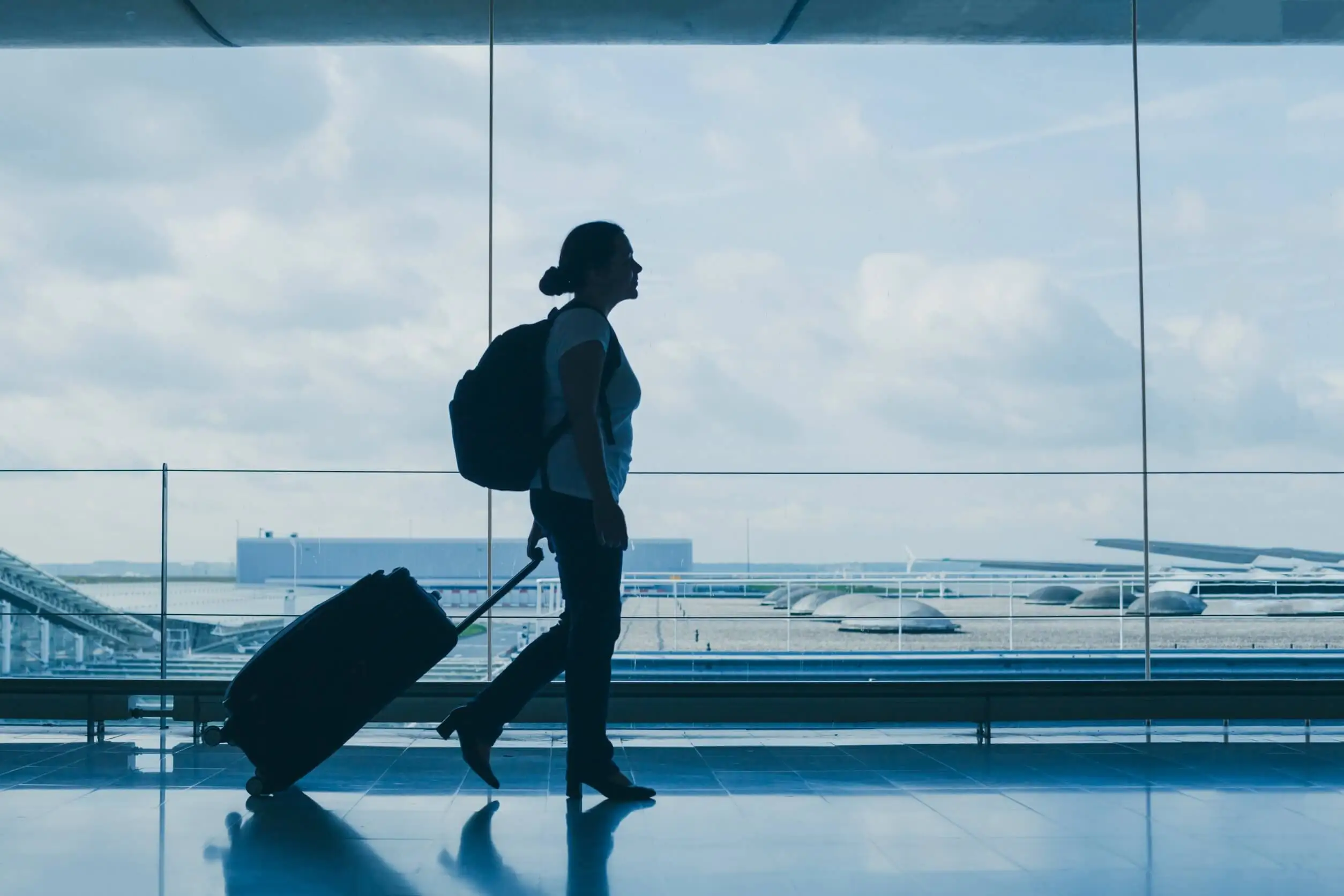Jet Lag: Tips for Overcoming Traveler's Malaise


Reviewed and approved by the doctor Leonardo Biolatto
Traveling between countries with different time zones causes jet lag in some people. The body resents journeys that involve crossing several time zones in a single itinerary. Although jet lag is temporary, it has a negative impact on a person’s daily routine and performance.
Any journey that leads to a country with a time zone three times longer than usual confuses the internal human clock, which has a register that indicates when to eat or when to sleep. These are two functions impaired by this condition, which is also sometimes called “traveler’s sickness.”
Fortunately, there are some things that you can do to reduce the symptoms. Before we reveal them, let’s delve a little deeper into the concept of jet lag itself.
What is jet lag, and how does it affect travelers?
The journal Travel Medicine and Infectious Diseases reports that jet lag is a sleep disorder that affects the circadian rhythm. The syndrome is often a product of transmeridian flights due to the excessively rapid crossing of time zones.
Those who experience it manifest daytime sleepiness, insomnia, and somatic symptoms, as the body needs to adapt to a new routine by synchronizing the periods of light and darkness as if they were the ones it inhabits.
Human Brain Mapping carried out a neuroimaging study to analyze the effects of jet lag. The research revealed that adding or subtracting hours to the internal clock affects the activity of brain regions linked to sleep and neuroendocrine behaviors.
Other names for jet lag include “time zone syndrome,” “jet lag” and “circadian dysrhythmia.”
What are the symptoms of jet lag?
Certain factors increase the chances of experiencing circadian dysrhythmia. The Mayo Clinic highlights frequent travel and flying east as among the most common sources, as you’re going against the biological clock this way.
Insomnia is the most common symptom, along with waking up too early or spending the day drowsy. Travelers with jet lag may also experience irritability and the following discomforts:
- Anxiety
- Weakness
- Lack of appetite
- Fatigue and tiredness
- Poor concentration
- Difficulty in memory
- Headaches and stomach aches

We think you may also enjoy reading this article: Everything You Need to Know about Hodophobia, or Fear of Travel
Tips to overcome jet lag before, during, and after the trip
The time zone syndrome reduces its impact if you put into practice recommendations before your trip, during the flight, and once you land at your destination. These habits are presented below.
Before the trip
- Rest: Sleeping as much as you can contribute to arriving well-rested and facilitates the adaptation to the new schedule. It also benefits your peace of mind by avoiding worries and not leaving tasks to the last minute.
- Adjust your internal clock: If the trip is planned in advance, modify your meal and sleep hours according to the place you’re going to visit. For intercontinental flights, it’s useful to stay up half an hour later for several nights in a row.
- Schedule your arrival a couple of days in advance before any important events: The adjustment to the time zone is less abrupt if you plan to arrive at least two days in advance or enough time to get used to the foreign dynamics.
During the flight
- Stay hydrated: The Aerospace Medical Association suggests drinking 8 ounces of water every hour during a long flight, since the humidity inside the cabin is low and tends to cause dehydration.
- Move around when you can: When the flight is too long, walking a little in the aisle of the plane promotes blood circulation. When it is forbidden to get up, you can do simple exercises from your seat to move your joints.
- Zero coffee or alcohol: Both caffeine and alcoholic beverages promote tiredness and alter sleep patterns. Omit these substances during the flight; do not eat outside the schedules established by the airlines.
Once at your destination
- Resist the urge to nap: Leave rest for the night. This slows down the effects of jet lag.
- Get active: Walking, jogging, and stretching exercises work endorphins and maintain the dynamism that’s essential for resetting the body’s biological clock.
- Eat at the right time: It’s essential to adjust to the mealtime in the country of destination. Eating at the right time makes the body function well and minimizes the discomfort of jet lag.
- Move with the daylight: If you want to overcome circadian dysrhythmia, keep your schedule according to the time of the country you are visiting, even if you feel tired when you land. It’s essential to act with sunlight to adjust your body.

Other alternatives to deal with jet lag
Melatonin helps reduce the effects of sleep disorders. The pineal gland produces this hormone naturally, but there are supplements that reduce the time of conciliation of rest, which is useful in cases such as jet lag.
For its part, the American Academy of Sleep Medicine proposes light therapy for jet lag. Exposure to bright light in the morning alleviates symptoms if you’re traveling east; the same action in the evening lessens jet lag when traveling west. This light therapy, as the institution argues, provides the eyes with safe, intense amounts of artificial light at a specific, regular time. The goal is to impact the biological clock as sunlight would.
This kind of treatment can be guided by a sleep physician.
Like this article? You may also like to read: 9 Tips to Take Care of Your Finances During Vacation Time
How long does jet lag last?
Jet lag syndrome doesn’t last long, but it is uncomfortable and can prevent you from enjoying your trip. It usually occurs during the first two days after arrival and may last longer, depending on how many time zones are crossed. Symptoms are more common in children and adults over 50 years of age. This is highlighted by the Hospital Cliníc de Barcelona.
All cited sources were thoroughly reviewed by our team to ensure their quality, reliability, currency, and validity. The bibliography of this article was considered reliable and of academic or scientific accuracy.
- ¿Cómo evitar el jet lag al viajar? Hospital Cliníc Barcelona. España; 2021. https://www.clinicbarcelona.org/noticias/como-evitar-el-jet-lag-al-viajar#:~:text=Aunque%20es%20imposible%20evitar%20el,husos%20horarios%20se%20hayan%20cruzado.
- Tips de Salud para Viajar en Aerolíneas. Asociación Médica Aeroespacial. Estados Unidos. https://www.asma.org/asma/media/asma/Travel-Publications/HEALTH-TIPS-FOR-AIRLINE-TRAVEL-Trifold-2013.pdf
- Terapia de luz brillante. Academia Estadounidense de Medicina del Sueño. Estados Unidos; 2020. https://sleepeducation.org/patients/bright-light-therapy/
- Gao S, Gong Q, Jia Z, Li H, Li W, Sweeney J, Zhang F. El efecto del jet lag en el cerebro humano: un estudio de neuroimagen. Mapeo del Cerebro Humano. Vol. 41. Núm. 9. pp. 2281-2291. Estados Unidos; 2020. https://www.ncbi.nlm.nih.gov/pmc/articles/PMC7268074/#:~:text=Acute%20jet%20lag%20has%20been,et%20al.%2C%202015).
- Ortega Albás JJ, Poza JJ, Pujol M, Romero O. Melatonina en los trastornos de sueño. Neurología. Sociedad Española de Neurología. España; 2018. https://www.elsevier.es/es-revista-neurologia-295-avance-resumen-melatonina-los-trastornos-sueno-S0213485318302007
- Sack R. La fisiopatología del jet lag. Medicina de Viajes y Enfermedades Infecciosas. Vol. 7. Núm. 2. pp. 102-110. Reino Unido; 2009. https://www.mendeley.com/catalogue/9f6c586f-8697-35b9-a62e-56c8c4d36514/?utm_source=desktop&utm_medium=1.19.4&utm_campaign=open_catalog&userDocumentId=%7B9e214696-16cf-4897-a7a3-e3061a310fce%7D
- Trastorno del jet lag. Clínica Mayo. Estados Unidos; 2020. https://www.mayoclinic.org/es-es/diseases-conditions/jet-lag/symptoms-causes/syc-20374027
This text is provided for informational purposes only and does not replace consultation with a professional. If in doubt, consult your specialist.








